Surah Ankabut
Contents
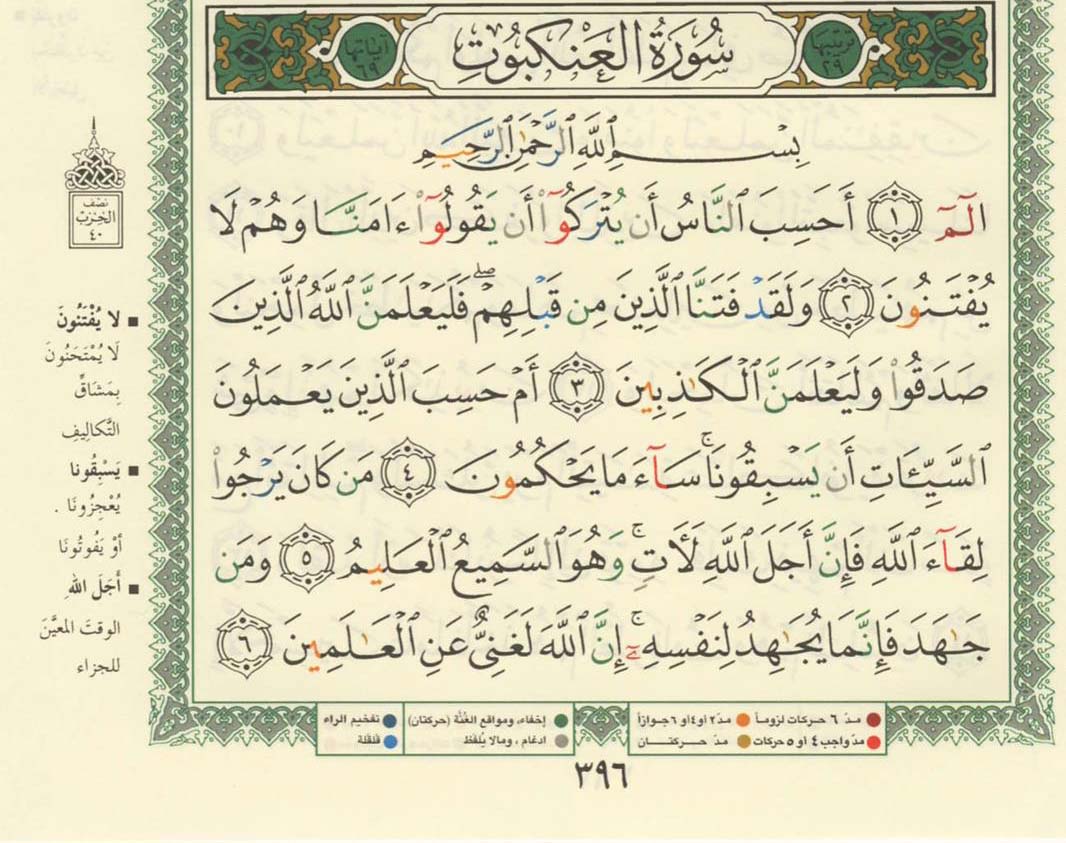
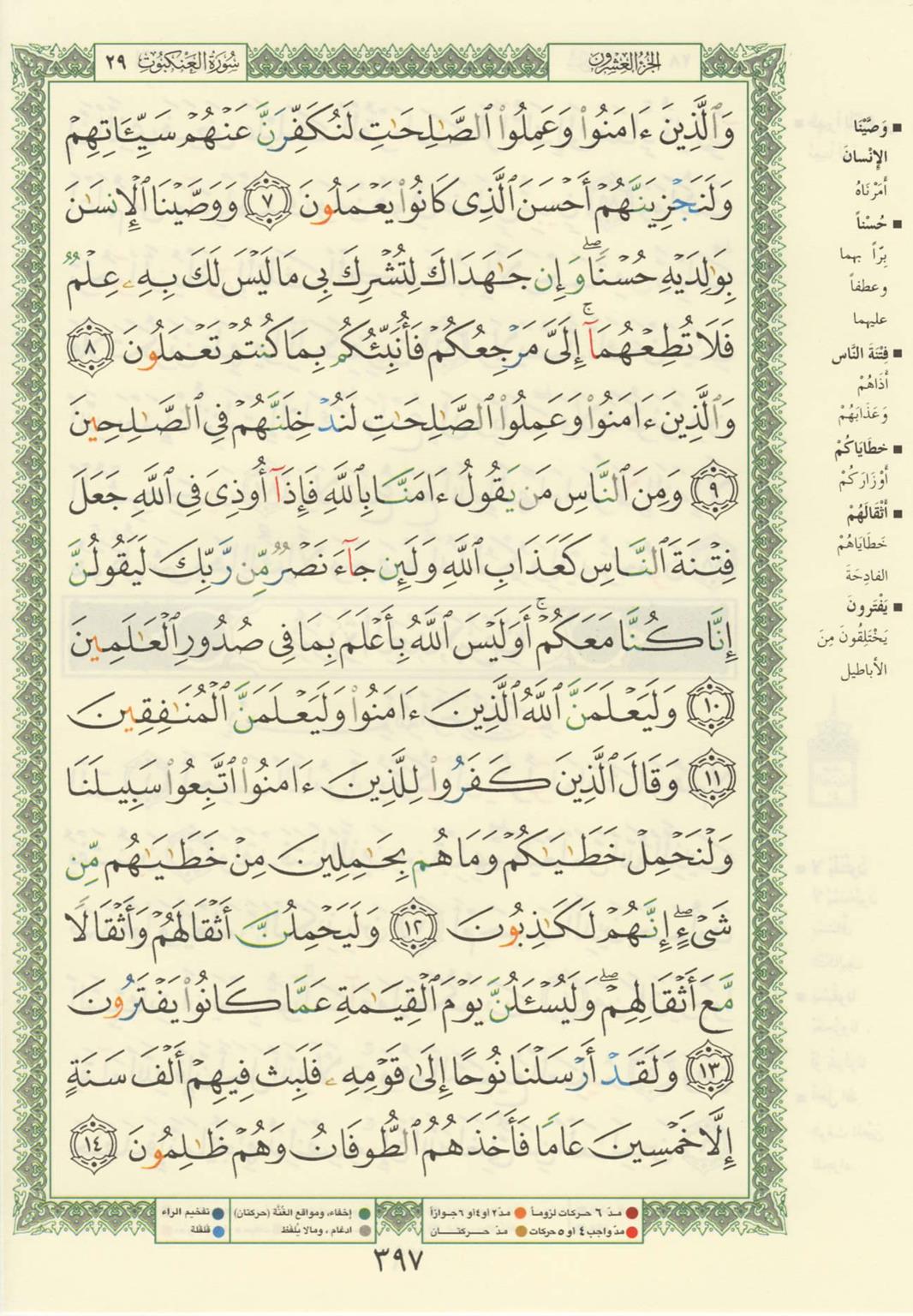
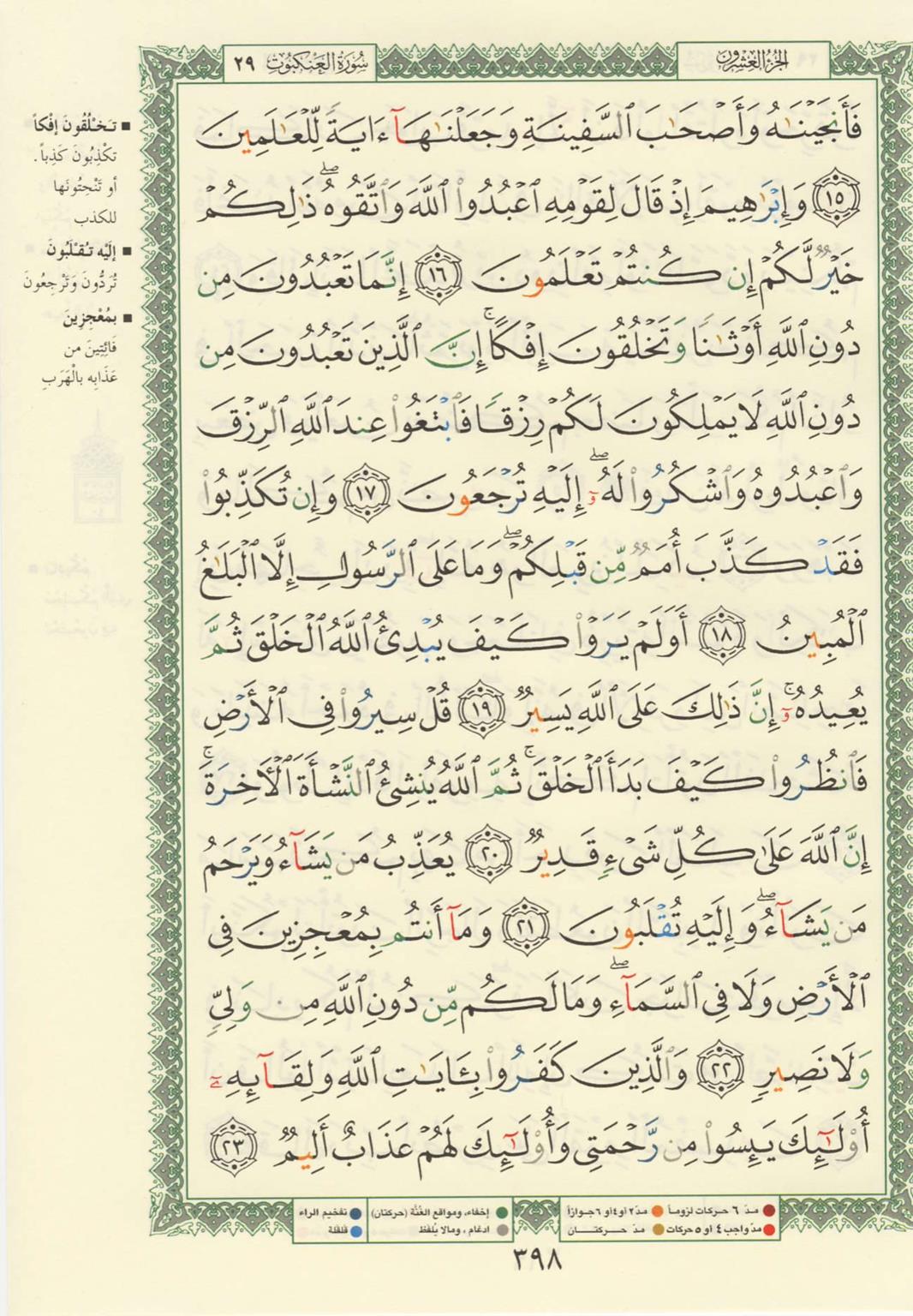
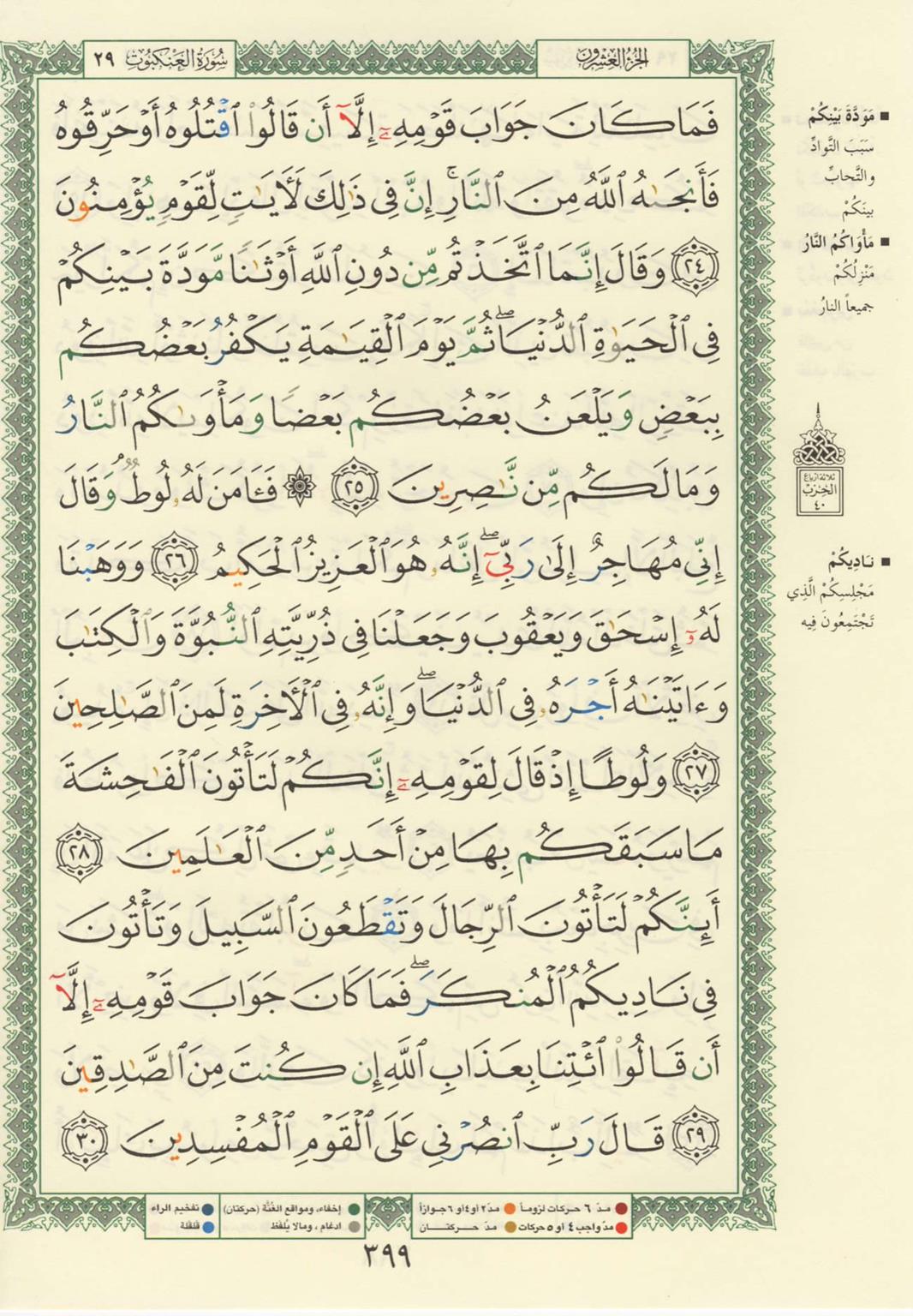
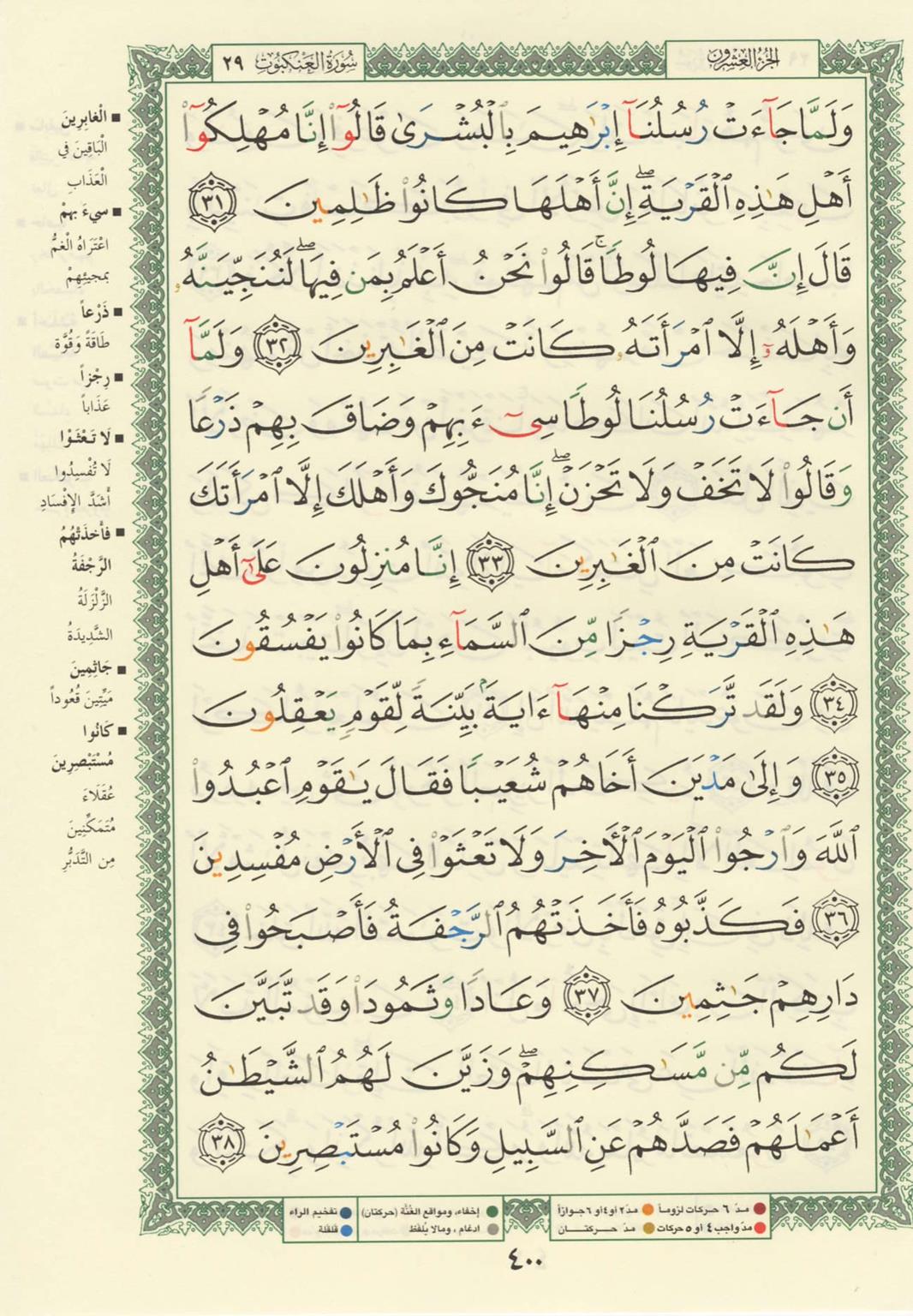
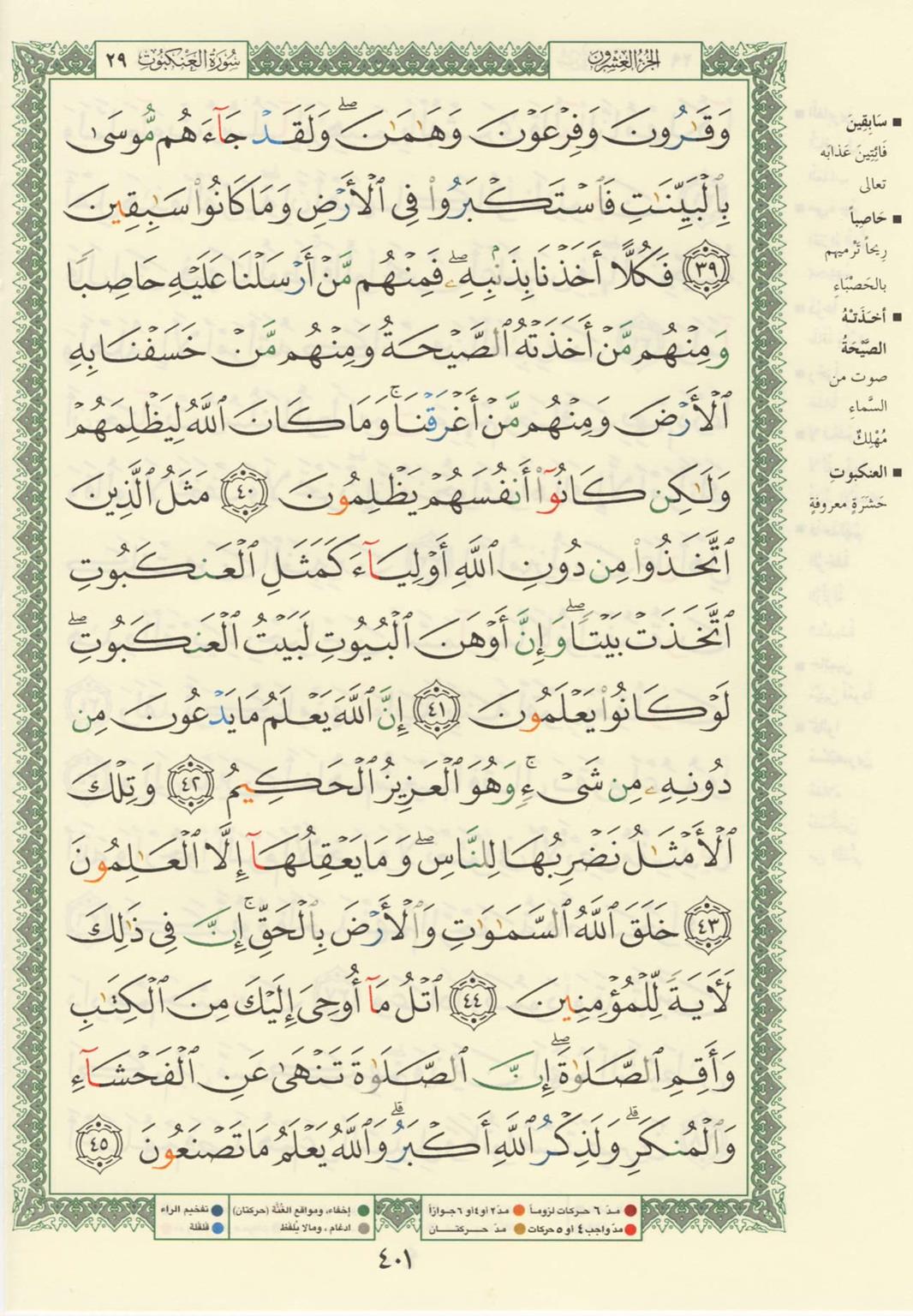
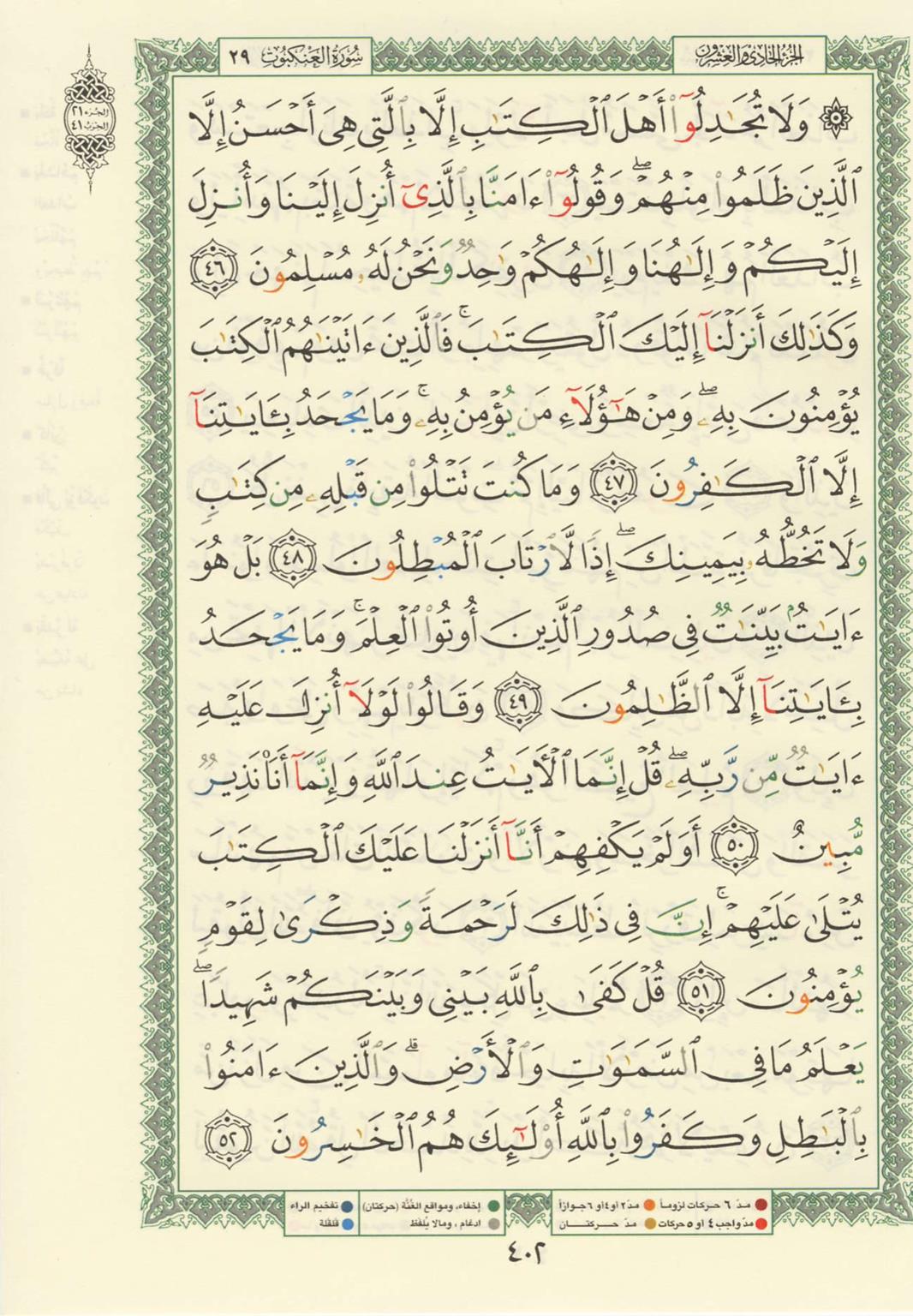
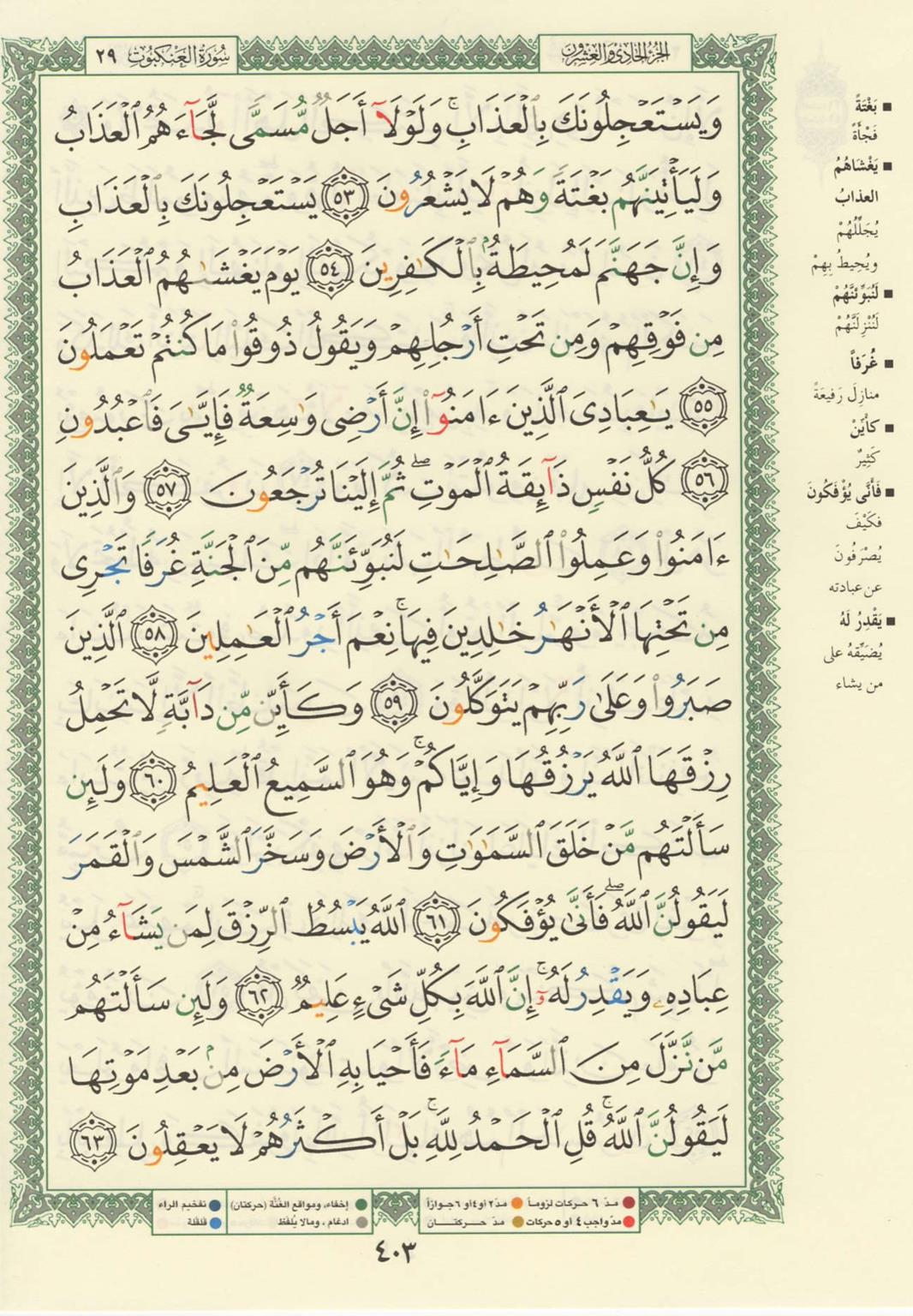
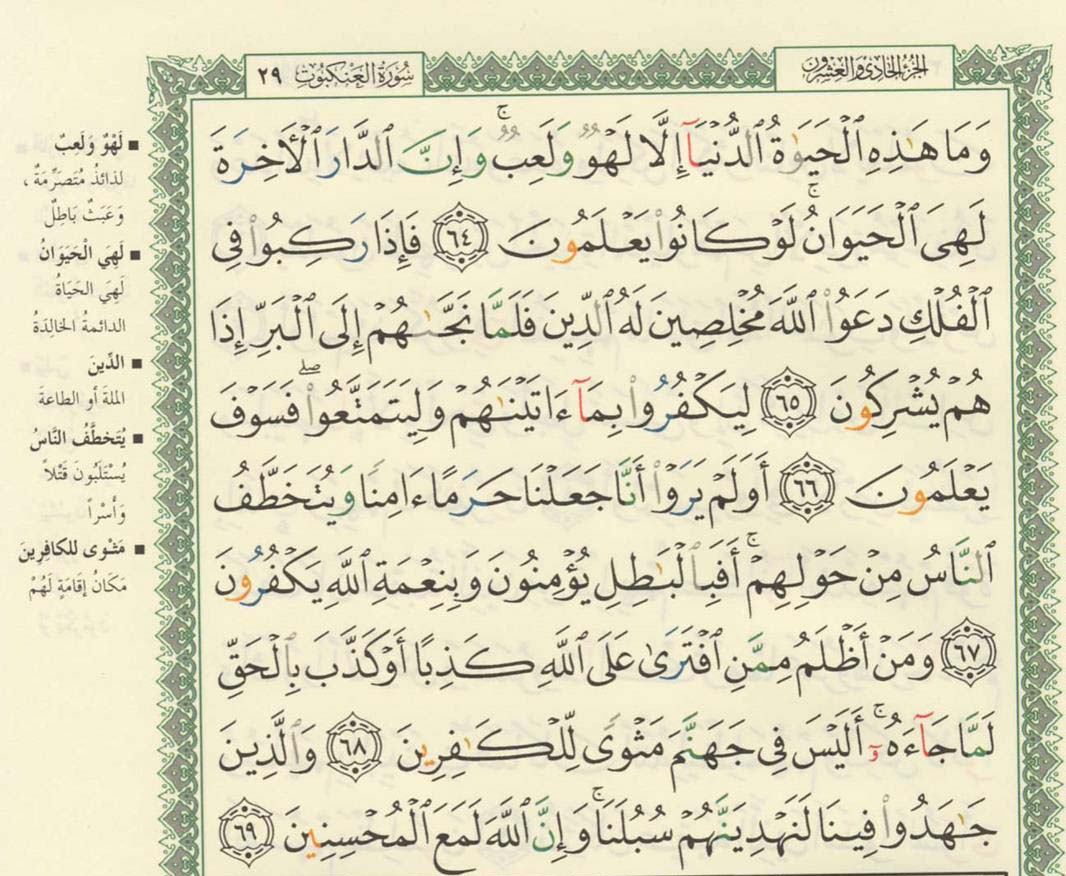
Page 396
29:1
ا-ل-م
![]() الٓمٓ
الٓمّٓ
alif-lam-meem
Alif Laam Meem.
الٓمٓ
الٓمّٓ
alif-lam-meem
Alif Laam Meem.
29:2
ح-س-ب
![]() أَحَسِبَ
اَحَسِبَ
aḥasiba
Do think
أَحَسِبَ
اَحَسِبَ
aḥasiba
Do think
ن-و-س
![]() ٱلنَّاسُ
النَّاسُ
n-nāsu
the people
ٱلنَّاسُ
النَّاسُ
n-nāsu
the people
ا-ن
![]() أَن
اَنْ
an
that
أَن
اَنْ
an
that
ت-ر-ك
![]() يُتۡرَكُوٓاْ
یُّتْرَكُوْۤا
yut'rakū
they will be left
يُتۡرَكُوٓاْ
یُّتْرَكُوْۤا
yut'rakū
they will be left
ا-ن
![]() أَن
اَنْ
an
because
أَن
اَنْ
an
because
ق-و-ل
![]() يَقُولُوٓاْ
یَّقُوْلُوْۤا
yaqūlū
they say,
يَقُولُوٓاْ
یَّقُوْلُوْۤا
yaqūlū
they say,
ا-م-ن
![]() ءَامَنَّا
اٰمَنَّا
āmannā
"We believe"
ءَامَنَّا
اٰمَنَّا
āmannā
"We believe"
ه-م
![]() وَهُمۡ
وَهُمْ
wahum
and they
وَهُمۡ
وَهُمْ
wahum
and they
ل-ا
![]() لَا
لَا
lā
will not be tested?
لَا
لَا
lā
will not be tested?
ف-ت-ن
![]() يُفۡتَنُونَ
یُفْتَنُوْنَ
yuf'tanūna
will not be tested?
يُفۡتَنُونَ
یُفْتَنُوْنَ
yuf'tanūna
will not be tested?
29:3
ق-د
![]() وَلَقَدۡ
وَلَقَدْ
walaqad
And indeed,
وَلَقَدۡ
وَلَقَدْ
walaqad
And indeed,
ف-ت-ن
![]() فَتَنَّا
فَتَنَّا
fatannā
We tested
فَتَنَّا
فَتَنَّا
fatannā
We tested
ا-ل-ل-ذ
![]() ٱلَّذِينَ
الَّذِیْنَ
alladhīna
those who
ٱلَّذِينَ
الَّذِیْنَ
alladhīna
those who
م-ن
![]() مِن
مِنْ
min
(were) before them.
مِن
مِنْ
min
(were) before them.
ق-ب-ل
![]() قَبۡلِهِمۡۖ
قَبْلِهِمْ
qablihim
(were) before them.
قَبۡلِهِمۡۖ
قَبْلِهِمْ
qablihim
(were) before them.
ع-ل-م
![]() فَلَيَعۡلَمَنَّ
فَلَیَعْلَمَنَّ
falayaʿlamanna
And Allah will surely make evident
فَلَيَعۡلَمَنَّ
فَلَیَعْلَمَنَّ
falayaʿlamanna
And Allah will surely make evident
ا-ل-ه
![]() ٱللَّهُ
اللّٰهُ
l-lahu
And Allah will surely make evident
ٱللَّهُ
اللّٰهُ
l-lahu
And Allah will surely make evident
ا-ل-ل-ذ
![]() ٱلَّذِينَ
الَّذِیْنَ
alladhīna
those who
ٱلَّذِينَ
الَّذِیْنَ
alladhīna
those who
ص-د-ق
![]() صَدَقُواْ
صَدَقُوْا
ṣadaqū
(are) truthful
صَدَقُواْ
صَدَقُوْا
ṣadaqū
(are) truthful
ع-ل-م
![]() وَلَيَعۡلَمَنَّ
وَلَیَعْلَمَنَّ
walayaʿlamanna
and He will surely make evident
وَلَيَعۡلَمَنَّ
وَلَیَعْلَمَنَّ
walayaʿlamanna
and He will surely make evident
ك-ذ-ب
![]() ٱلۡكَٰذِبِينَ
الْكٰذِبِیْنَ
l-kādhibīna
the liars.
ٱلۡكَٰذِبِينَ
الْكٰذِبِیْنَ
l-kādhibīna
the liars.
29:4
ا-م
![]() أَمۡ
اَمْ
am
Or
أَمۡ
اَمْ
am
Or
ح-س-ب
![]() حَسِبَ
حَسِبَ
ḥasiba
think
حَسِبَ
حَسِبَ
ḥasiba
think
ا-ل-ل-ذ
![]() ٱلَّذِينَ
الَّذِیْنَ
alladhīna
those who
ٱلَّذِينَ
الَّذِیْنَ
alladhīna
those who
ع-م-ل
![]() يَعۡمَلُونَ
یَعْمَلُوْنَ
yaʿmalūna
do
يَعۡمَلُونَ
یَعْمَلُوْنَ
yaʿmalūna
do
س-و-ا
![]() ٱلسَّيِّـَٔاتِ
السَّیِّاٰتِ
s-sayiāti
evil deeds
ٱلسَّيِّـَٔاتِ
السَّیِّاٰتِ
s-sayiāti
evil deeds
ا-ن
![]() أَن
اَنْ
an
that
أَن
اَنْ
an
that
س-ب-ق
![]() يَسۡبِقُونَاۚ
یَّسْبِقُوْنَا ؕ—
yasbiqūnā
they can outrun Us.
يَسۡبِقُونَاۚ
یَّسْبِقُوْنَا ؕ—
yasbiqūnā
they can outrun Us.
س-و-ا
![]() سَآءَ
سَآءَ
sāa
Evil is
سَآءَ
سَآءَ
sāa
Evil is
م-ا
![]() مَا
مَا
mā
what
مَا
مَا
mā
what
ح-ك-م
![]() يَحۡكُمُونَ
یَحْكُمُوْنَ
yaḥkumūna
they judge.
يَحۡكُمُونَ
یَحْكُمُوْنَ
yaḥkumūna
they judge.
29:5
م-ن
![]() مَن
مَنْ
man
Whoever
مَن
مَنْ
man
Whoever
ك-و-ن
![]() كَانَ
كَانَ
kāna
[is]
كَانَ
كَانَ
kāna
[is]
ر-ج-و
![]() يَرۡجُواْ
یَرْجُوْا
yarjū
hopes
يَرۡجُواْ
یَرْجُوْا
yarjū
hopes
ل-ق-ي
![]() لِقَآءَ
لِقَآءَ
liqāa
(for the) meeting
لِقَآءَ
لِقَآءَ
liqāa
(for the) meeting
ا-ل-ه
![]() ٱللَّهِ
اللّٰهِ
l-lahi
(with) Allah,
ٱللَّهِ
اللّٰهِ
l-lahi
(with) Allah,
ا-ن-ن
![]() فَإِنَّ
فَاِنَّ
fa-inna
then indeed,
فَإِنَّ
فَاِنَّ
fa-inna
then indeed,
ا-ج-ل
![]() أَجَلَ
اَجَلَ
ajala
(the) Term
أَجَلَ
اَجَلَ
ajala
(the) Term
ا-ل-ه
![]() ٱللَّهِ
اللّٰهِ
l-lahi
(of) Allah
ٱللَّهِ
اللّٰهِ
l-lahi
(of) Allah
ا-ت-ي
![]() لَأٓتٖۚ
لَاٰتٍ ؕ—
laātin
(is) surely coming.
لَأٓتٖۚ
لَاٰتٍ ؕ—
laātin
(is) surely coming.
ه-و
![]() وَهُوَ
وَهُوَ
wahuwa
And He
وَهُوَ
وَهُوَ
wahuwa
And He
س-م-ع
![]() ٱلسَّمِيعُ
السَّمِیْعُ
s-samīʿu
(is) the All-Hearer,
ٱلسَّمِيعُ
السَّمِیْعُ
s-samīʿu
(is) the All-Hearer,
ع-ل-م
![]() ٱلۡعَلِيمُ
الْعَلِیْمُ
l-ʿalīmu
the All-Knower.
ٱلۡعَلِيمُ
الْعَلِیْمُ
l-ʿalīmu
the All-Knower.
29:6
م-ن
![]() وَمَن
وَمَنْ
waman
And whoever
وَمَن
وَمَنْ
waman
And whoever
ج-ه-د
![]() جَٰهَدَ
جَاهَدَ
jāhada
strives
جَٰهَدَ
جَاهَدَ
jāhada
strives
ا-ن-ن-م
![]() فَإِنَّمَا
فَاِنَّمَا
fa-innamā
then only
فَإِنَّمَا
فَاِنَّمَا
fa-innamā
then only
ج-ه-د
![]() يُجَٰهِدُ
یُجَاهِدُ
yujāhidu
he strives
يُجَٰهِدُ
یُجَاهِدُ
yujāhidu
he strives
ن-ف-س
![]() لِنَفۡسِهِۦٓۚ
لِنَفْسِهٖ ؕ—
linafsihi
for himself.
لِنَفۡسِهِۦٓۚ
لِنَفْسِهٖ ؕ—
linafsihi
for himself.
ا-ن-ن
![]() إِنَّ
اِنَّ
inna
Indeed,
إِنَّ
اِنَّ
inna
Indeed,
ا-ل-ه
![]() ٱللَّهَ
اللّٰهَ
l-laha
Allah
ٱللَّهَ
اللّٰهَ
l-laha
Allah
غ-ن-ي
![]() لَغَنِيٌّ
لَغَنِیٌّ
laghaniyyun
(is) Free from need
لَغَنِيٌّ
لَغَنِیٌّ
laghaniyyun
(is) Free from need
ع-ن
![]() عَنِ
عَنِ
ʿani
of
عَنِ
عَنِ
ʿani
of
ع-ل-م
![]() ٱلۡعَٰلَمِينَ
الْعٰلَمِیْنَ
l-ʿālamīna
the worlds.
ٱلۡعَٰلَمِينَ
الْعٰلَمِیْنَ
l-ʿālamīna
the worlds.
29:7
ا-ل-ل-ذ
![]() وَٱلَّذِينَ
وَالَّذِیْنَ
wa-alladhīna
And those who
وَٱلَّذِينَ
وَالَّذِیْنَ
wa-alladhīna
And those who
ا-م-ن
![]() ءَامَنُواْ
اٰمَنُوْا
āmanū
believe
ءَامَنُواْ
اٰمَنُوْا
āmanū
believe
ع-م-ل
![]() وَعَمِلُواْ
وَعَمِلُوا
waʿamilū
and do
وَعَمِلُواْ
وَعَمِلُوا
waʿamilū
and do
ص-ل-ح
![]() ٱلصَّٰلِحَٰتِ
الصّٰلِحٰتِ
ṣ-ṣāliḥāti
righteous (deeds),
ٱلصَّٰلِحَٰتِ
الصّٰلِحٰتِ
ṣ-ṣāliḥāti
righteous (deeds),
ك-ف-ر
![]() لَنُكَفِّرَنَّ
لَنُكَفِّرَنَّ
lanukaffiranna
surely, We will remove
لَنُكَفِّرَنَّ
لَنُكَفِّرَنَّ
lanukaffiranna
surely, We will remove
ع-ن
![]() عَنۡهُمۡ
عَنْهُمْ
ʿanhum
from them
عَنۡهُمۡ
عَنْهُمْ
ʿanhum
from them
س-و-ا
![]() سَيِّـَٔاتِهِمۡ
سَیِّاٰتِهِمْ
sayyiātihim
their evil deeds,
سَيِّـَٔاتِهِمۡ
سَیِّاٰتِهِمْ
sayyiātihim
their evil deeds,
ج-ز-ي
![]() وَلَنَجۡزِيَنَّهُمۡ
وَلَنَجْزِیَنَّهُمْ
walanajziyannahum
and We will surely reward them
وَلَنَجۡزِيَنَّهُمۡ
وَلَنَجْزِیَنَّهُمْ
walanajziyannahum
and We will surely reward them
ح-س-ن
![]() أَحۡسَنَ
اَحْسَنَ
aḥsana
(the) best
أَحۡسَنَ
اَحْسَنَ
aḥsana
(the) best
ا-ل-ل-ذ
![]() ٱلَّذِي
الَّذِیْ
alladhī
(of) what
ٱلَّذِي
الَّذِیْ
alladhī
(of) what
ك-و-ن
![]() كَانُواْ
كَانُوْا
kānū
they used
كَانُواْ
كَانُوْا
kānū
they used
ع-م-ل
![]() يَعۡمَلُونَ
یَعْمَلُوْنَ
yaʿmalūna
(to) do.
يَعۡمَلُونَ
یَعْمَلُوْنَ
yaʿmalūna
(to) do.
29:8
و-ص-ي
![]() وَوَصَّيۡنَا
وَوَصَّیْنَا
wawaṣṣaynā
And We have enjoined
وَوَصَّيۡنَا
وَوَصَّیْنَا
wawaṣṣaynā
And We have enjoined
ا-ن-س
![]() ٱلۡإِنسَٰنَ
الْاِنْسَانَ
l-insāna
(on) man
ٱلۡإِنسَٰنَ
الْاِنْسَانَ
l-insāna
(on) man
و-ل-د
![]() بِوَٰلِدَيۡهِ
بِوَالِدَیْهِ
biwālidayhi
goodness to his parents,
بِوَٰلِدَيۡهِ
بِوَالِدَیْهِ
biwālidayhi
goodness to his parents,
ح-س-ن
![]() حُسۡنٗاۖ
حُسْنًا ؕ—
ḥus'nan
goodness to his parents,
حُسۡنٗاۖ
حُسْنًا ؕ—
ḥus'nan
goodness to his parents,
ا-ن
![]() وَإِن
وَاِنْ
wa-in
but if
وَإِن
وَاِنْ
wa-in
but if
ج-ه-د
![]() جَٰهَدَاكَ
جَاهَدٰكَ
jāhadāka
they both strive against you
جَٰهَدَاكَ
جَاهَدٰكَ
jāhadāka
they both strive against you
ش-ر-ك
![]() لِتُشۡرِكَ
لِتُشْرِكَ
litush'rika
to make you associate
لِتُشۡرِكَ
لِتُشْرِكَ
litush'rika
to make you associate
ب
![]() بِي
بِیْ
bī
with Me
بِي
بِیْ
bī
with Me
م-ا
![]() مَا
مَا
mā
what
مَا
مَا
mā
what
ل-ي-س
![]() لَيۡسَ
لَیْسَ
laysa
not
لَيۡسَ
لَیْسَ
laysa
not
ل
![]() لَكَ
لَكَ
laka
you have
لَكَ
لَكَ
laka
you have
ب
![]() بِهِۦ
بِهٖ
bihi
of it
بِهِۦ
بِهٖ
bihi
of it
ع-ل-م
![]() عِلۡمٞ
عِلْمٌ
ʿil'mun
any knowledge,
عِلۡمٞ
عِلْمٌ
ʿil'mun
any knowledge,
ل-ا
![]() فَلَا
فَلَا
falā
then (do) not
فَلَا
فَلَا
falā
then (do) not
ط-و-ع
![]() تُطِعۡهُمَآۚ
تُطِعْهُمَا ؕ—
tuṭiʿ'humā
obey both of them.
تُطِعۡهُمَآۚ
تُطِعْهُمَا ؕ—
tuṭiʿ'humā
obey both of them.
ا-ل-ي
![]() إِلَيَّ
اِلَیَّ
ilayya
To Me
إِلَيَّ
اِلَیَّ
ilayya
To Me
ر-ج-ع
![]() مَرۡجِعُكُمۡ
مَرْجِعُكُمْ
marjiʿukum
(is) your return,
مَرۡجِعُكُمۡ
مَرْجِعُكُمْ
marjiʿukum
(is) your return,
ن-ب-ا
![]() فَأُنَبِّئُكُم
فَاُنَبِّئُكُمْ
fa-unabbi-ukum
and I will inform you
فَأُنَبِّئُكُم
فَاُنَبِّئُكُمْ
fa-unabbi-ukum
and I will inform you
ب-م-ا
![]() بِمَا
بِمَا
bimā
about what
بِمَا
بِمَا
bimā
about what
ك-و-ن
![]() كُنتُمۡ
كُنْتُمْ
kuntum
you used
كُنتُمۡ
كُنْتُمْ
kuntum
you used
ع-م-ل
![]() تَعۡمَلُونَ
تَعْمَلُوْنَ
taʿmalūna
(to) do.
تَعۡمَلُونَ
تَعْمَلُوْنَ
taʿmalūna
(to) do.
29:9
ا-ل-ل-ذ
![]() وَٱلَّذِينَ
وَالَّذِیْنَ
wa-alladhīna
And those who
وَٱلَّذِينَ
وَالَّذِیْنَ
wa-alladhīna
And those who
ا-م-ن
![]() ءَامَنُواْ
اٰمَنُوْا
āmanū
believe
ءَامَنُواْ
اٰمَنُوْا
āmanū
believe
ع-م-ل
![]() وَعَمِلُواْ
وَعَمِلُوا
waʿamilū
and do
وَعَمِلُواْ
وَعَمِلُوا
waʿamilū
and do
ص-ل-ح
![]() ٱلصَّٰلِحَٰتِ
الصّٰلِحٰتِ
ṣ-ṣāliḥāti
righteous deeds
ٱلصَّٰلِحَٰتِ
الصّٰلِحٰتِ
ṣ-ṣāliḥāti
righteous deeds
د-خ-ل
![]() لَنُدۡخِلَنَّهُمۡ
لَنُدْخِلَنَّهُمْ
lanud'khilannahum
We will surely admit them
لَنُدۡخِلَنَّهُمۡ
لَنُدْخِلَنَّهُمْ
lanud'khilannahum
We will surely admit them
ف-ي
![]() فِي
فِی
fī
among
فِي
فِی
fī
among
ص-ل-ح
![]() ٱلصَّٰلِحِينَ
الصّٰلِحِیْنَ
ṣ-ṣāliḥīna
the righteous.
ٱلصَّٰلِحِينَ
الصّٰلِحِیْنَ
ṣ-ṣāliḥīna
the righteous.
29:10
م-ن
![]() وَمِنَ
وَمِنَ
wamina
And of
وَمِنَ
وَمِنَ
wamina
And of
ن-و-س
![]() ٱلنَّاسِ
النَّاسِ
n-nāsi
the people
ٱلنَّاسِ
النَّاسِ
n-nāsi
the people
م-ن
![]() مَن
مَنْ
man
(is he) who
مَن
مَنْ
man
(is he) who
ق-و-ل
![]() يَقُولُ
یَّقُوْلُ
yaqūlu
says,
يَقُولُ
یَّقُوْلُ
yaqūlu
says,
ا-م-ن
![]() ءَامَنَّا
اٰمَنَّا
āmannā
"We believe
ءَامَنَّا
اٰمَنَّا
āmannā
"We believe
ا-ل-ه
![]() بِٱللَّهِ
بِاللّٰهِ
bil-lahi
in Allah."
بِٱللَّهِ
بِاللّٰهِ
bil-lahi
in Allah."
ا-ذ-ا
![]() فَإِذَآ
فَاِذَاۤ
fa-idhā
But when
فَإِذَآ
فَاِذَاۤ
fa-idhā
But when
ا-ذ-ي
![]() أُوذِيَ
اُوْذِیَ
ūdhiya
he is harmed
أُوذِيَ
اُوْذِیَ
ūdhiya
he is harmed
ف-ي
![]() فِي
فِی
fī
in
فِي
فِی
fī
in
ا-ل-ه
![]() ٱللَّهِ
اللّٰهِ
l-lahi
(the Way of) Allah
ٱللَّهِ
اللّٰهِ
l-lahi
(the Way of) Allah
ج-ع-ل
![]() جَعَلَ
جَعَلَ
jaʿala
he considers
جَعَلَ
جَعَلَ
jaʿala
he considers
ف-ت-ن
![]() فِتۡنَةَ
فِتْنَةَ
fit'nata
(the) trial
فِتۡنَةَ
فِتْنَةَ
fit'nata
(the) trial
ن-و-س
![]() ٱلنَّاسِ
النَّاسِ
n-nāsi
(of) the people
ٱلنَّاسِ
النَّاسِ
n-nāsi
(of) the people
ع-ذ-ب
![]() كَعَذَابِ
كَعَذَابِ
kaʿadhābi
as (the) punishment
كَعَذَابِ
كَعَذَابِ
kaʿadhābi
as (the) punishment
ا-ل-ه
![]() ٱللَّهِۖ
اللّٰهِ ؕ—
l-lahi
(of) Allah.
ٱللَّهِۖ
اللّٰهِ ؕ—
l-lahi
(of) Allah.
ل-ا-ن
![]() وَلَئِن
وَلَىِٕنْ
wala-in
But if
وَلَئِن
وَلَىِٕنْ
wala-in
But if
ج-ي-ا
![]() جَآءَ
جَآءَ
jāa
comes
جَآءَ
جَآءَ
jāa
comes
ن-ص-ر
![]() نَصۡرٞ
نَصْرٌ
naṣrun
victory
نَصۡرٞ
نَصْرٌ
naṣrun
victory
م-ن
![]() مِّن
مِّنْ
min
from
مِّن
مِّنْ
min
from
ر-ب-ب
![]() رَّبِّكَ
رَّبِّكَ
rabbika
your Lord,
رَّبِّكَ
رَّبِّكَ
rabbika
your Lord,
ق-و-ل
![]() لَيَقُولُنَّ
لَیَقُوْلُنَّ
layaqūlunna
surely they say,
لَيَقُولُنَّ
لَیَقُوْلُنَّ
layaqūlunna
surely they say,
ا-ن-ن
![]() إِنَّا
اِنَّا
innā
"Indeed, we
إِنَّا
اِنَّا
innā
"Indeed, we
ك-و-ن
![]() كُنَّا
كُنَّا
kunnā
were
كُنَّا
كُنَّا
kunnā
were
م-ع
![]() مَعَكُمۡۚ
مَعَكُمْ ؕ—
maʿakum
with you."
مَعَكُمۡۚ
مَعَكُمْ ؕ—
maʿakum
with you."
ل-ي-س
![]() أَوَلَيۡسَ
اَوَلَیْسَ
awalaysa
Is not
أَوَلَيۡسَ
اَوَلَیْسَ
awalaysa
Is not
ا-ل-ه
![]() ٱللَّهُ
اللّٰهُ
l-lahu
Allah
ٱللَّهُ
اللّٰهُ
l-lahu
Allah
ع-ل-م
![]() بِأَعۡلَمَ
بِاَعْلَمَ
bi-aʿlama
most knowing
بِأَعۡلَمَ
بِاَعْلَمَ
bi-aʿlama
most knowing
ب-م-ا
![]() بِمَا
بِمَا
bimā
of what
بِمَا
بِمَا
bimā
of what
ف-ي
![]() فِي
فِیْ
fī
(is) in
فِي
فِیْ
fī
(is) in
ص-د-ر
![]() صُدُورِ
صُدُوْرِ
ṣudūri
(the) breasts
صُدُورِ
صُدُوْرِ
ṣudūri
(the) breasts
ع-ل-م
![]() ٱلۡعَٰلَمِينَ
الْعٰلَمِیْنَ
l-ʿālamīna
(of) the worlds?
ٱلۡعَٰلَمِينَ
الْعٰلَمِیْنَ
l-ʿālamīna
(of) the worlds?

